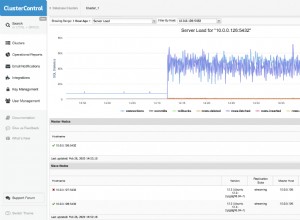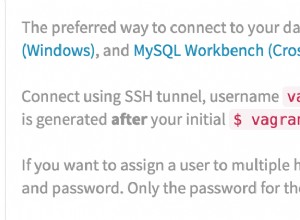UPPER() i BINARY_CI mogą dawać te same wyniki, ale Oracle nie może ich używać zamiennie. Aby użyć indeksu i BINARY_CI, musisz utworzyć indeks w następujący sposób:
create index src_nlssort_index on src(nlssort(b, 'nls_sort=''BINARY_CI'''));
Przykładowa tabela i mieszane dane dotyczące wielkości liter
create table src(b varchar2(100) not null);
insert into src select 'MiXeD CAse '||level from dual connect by level <= 100000;
Domyślnie predykat upper() może przeprowadzić skanowanie zakresu indeksu upper()
create index src_upper_index on src(upper(b));
explain plan for
select * from src where upper(b) = 'MIXED CASE 1';
select * from table(dbms_xplan.display(format => '-rows -bytes -cost -predicate
-note'));
Plan hash value: 1533361696
------------------------------------------------------------------
| Id | Operation | Name | Time |
------------------------------------------------------------------
| 0 | SELECT STATEMENT | | 00:00:01 |
| 1 | TABLE ACCESS BY INDEX ROWID| SRC | 00:00:01 |
| 2 | INDEX RANGE SCAN | SRC_UPPER_INDEX | 00:00:01 |
------------------------------------------------------------------
BINARY_CI i LINGUISTIC nie będą używać indeksu
alter session set nls_sort='binary_ci';
alter session set nls_comp='linguistic';
explain plan for
select * from src where b = 'MIXED CASE 1';
select * from table(dbms_xplan.display(format => '-rows -bytes -cost -note'));
Plan hash value: 3368256651
---------------------------------------------
| Id | Operation | Name | Time |
---------------------------------------------
| 0 | SELECT STATEMENT | | 00:00:02 |
|* 1 | TABLE ACCESS FULL| SRC | 00:00:02 |
---------------------------------------------
Predicate Information (identified by operation id):
---------------------------------------------------
1 - filter(NLSSORT("B",'nls_sort=''BINARY_CI''')=HEXTORAW('6D69786564
2063617365203100') )
Indeks oparty na funkcjach na podstawie NLSSORT() umożliwia skanowanie zakresu indeksów
create index src_nlssort_index on src(nlssort(b, 'nls_sort=''BINARY_CI'''));
explain plan for
select * from src where b = 'MIXED CASE 1';
select * from table(dbms_xplan.display(format => '-rows -bytes -cost -note'));
Plan hash value: 478278159
--------------------------------------------------------------------
| Id | Operation | Name | Time |
--------------------------------------------------------------------
| 0 | SELECT STATEMENT | | 00:00:01 |
| 1 | TABLE ACCESS BY INDEX ROWID| SRC | 00:00:01 |
|* 2 | INDEX RANGE SCAN | SRC_NLSSORT_INDEX | 00:00:01 |
--------------------------------------------------------------------
Predicate Information (identified by operation id):
---------------------------------------------------
2 - access(NLSSORT("B",'nls_sort=''BINARY_CI''')=HEXTORAW('6D69786564
2063617365203100') )




